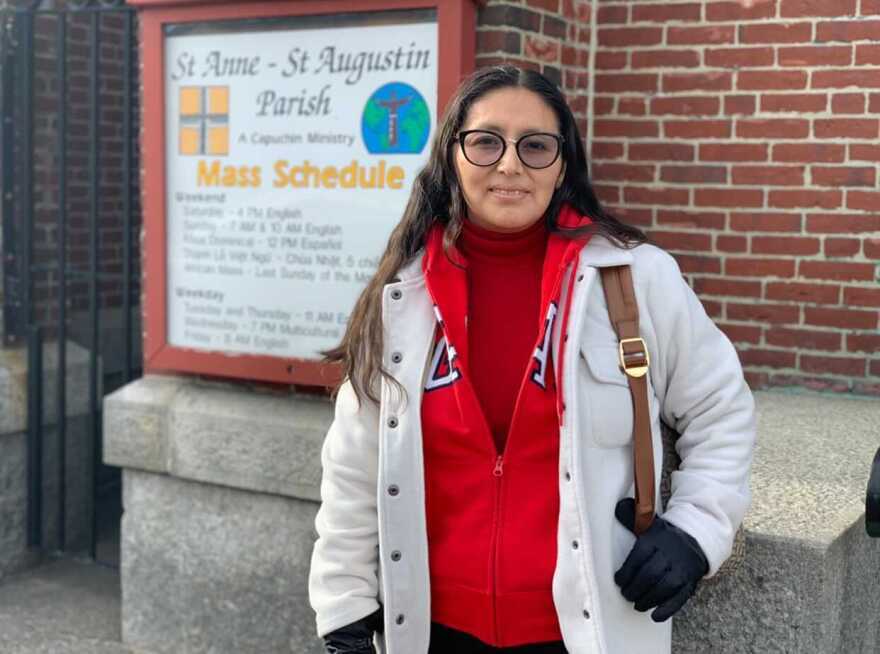N.H. immigrants prosper inside English classes in wake of labor shortage

Gissela Yanez in her first day of English classes at Saint Augustine Parish Hall in Manchester, N.H. (Gabriela Lozada/NHPR)
Gissela Yanez arrived pregnant from Peru in New Hampshire in 2020. She has a college degree and was a physical therapist back in Peru. But here she cleans houses. She found the job quickly, and she said it makes her feel disappointed in her abilities. She knows she can do more.
Like many new immigrants, Yanez doesn’t speak English but longs to get a physical therapy license to continue to work in her profession. Many people like her have to revalidate their diplomas first if they want to continue their careers in the U.S. Sometimes, that process never happens because of cost and the lack of language skills.
But the pandemic and motherhood changed the way she sees her future.
Click here to listen to the radio version of this story from New Hampshire Public Radio.
“I am motivated because there are more people following their dreams and more opportunities open,” said Yanez in Spanish, who decided it was time to learn English this year. She signed up for them at the Saint Augustine Parish Hall in Manchester, N.H.
On her first day of classes, she sits next to four other women.

Twice a week, women and men gather at Saint Augustine Parish Hall to receive free English classes. (Gabriela Lozada/NHPR)
Sister Madonna Moran coordinates the English classes there. She says she’s seen a lot more women like Yanez join the free lesson during the pandemic. Some want to advance their careers in health care, a field in which there’s an acute labor shortage in New Hampshire.
“People want to have a job and enough income to support their families,” said Moran.
A 2021 study suggests New Hampshire has the second-highest number of job openings per unemployed person. And if you walk through downtown Manchester, you will see help wanted signs hanging on many windows and doors, especially for retail and food services.
Hospitality, manufacturing, and food processing are sectors that are also struggling with a labor shortage. Moran, and others who teach English in Manchester, say those businesses are proactively reaching out to them, wondering if any of their students are looking for a job.
One of those places is the International Institute of New England, another organization offering English classes. Andrew Cullen works closely there with immigrants, pairing them with job opportunities that come to the Institute. He said at least five businesses approach the institute each week looking for workers, which he said represents a pretty big jump from previous years.
“For our clients, [it’s ]the best time to be looking for a job because they almost have negotiating powers in some senses,” said Cullen.
Since last August, the International Institute has also received a steady stream of students interested in advancing their careers. In the past two months, around 200 people have found occupation and career pathways through the Institute – that’s a record number compared to other years. And their salary per hour has gone up an extra four dollars plus benefits.
But for the Institute, it’s not all about the money for their clients. It aims to put people in careers with a potential for growth, like nursing, social services, or industrial machinery. They also connect them with a community college to help them find their vocation.
Kyabu Kisamu is one of the students at the Institute who has taken advantage of this opportunity. She is a refugee from the Democratic Republic of Congo who arrived in New Hampshire five months ago and didn’t speak any English then. But she has made tremendous progress.
Kisamu works in manufacturing for now, but she says she has bigger plans to become a nurse. In the future, she knows being bilingual will be an asset that gives her an extra edge in this job market.

Kyabu Kisamu has five children and is actively pursuing her dream of being a nurse in New Hampshire. (Gabriela Lozada/NHPR)
But it’s a challenge to study and work. Sometimes students find a job but have to quit English classes because they don’t have time to do both. Some employers have noticed this issue and are trying to support their employees; according to the Institute around ten businesses in the state now offer English classes during the workday.
Karen McCabe, skills trainer manager at the Institute, says business owners appreciate immigrants’ presence by letting the English class be part of that workday.
“They don’t have to think about extra child care or extra transportation because it is all part of the same day,” said McCabe.
Still looking for the correct words in her new vocabulary, Kisamu says she wants her life to be better. That’s what Yanez, who is studying for her physical therapy license, and many other immigrants inside English classes in New Hampshire wish.
